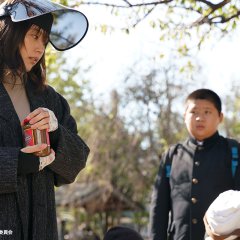 A Preview of Japanese Spring Dramas 2020
A Preview of Japanese Spring Dramas 2020 Arimura Kasumi suddenly gets a break from filming and returns to her hometown for the first time in a long while. Her mother Yumiko comes to the train station to pick her up and they head for the family home. She is idly chatting with her mother at home when a male stranger comes to visit. His name is Ueshima Makoto. He puts his hands together in front of Kasumi’s father’s tablet. Then her mother asks him to repair a bicycle. At Yumiko’s invitation, the three of them have dinner together. (Source: jdramas.wordpress.com) Edit Translation
- English
- magyar / magyar nyelv
- dansk
- Norsk
- Native Title: 有村架純の撮休
- Also Known As: Kasumi Arimura's Filming Break , A Day-Off of Kasumi Arimura
- Director: Koreeda Hirokazu, Yokohama Satoko, Yamagishi Santa
- Screenwriter & Director: Imaizumi Rikiya, Tsuno Megumi
- Screenwriter: Fujiki Mitsuhiko, Shinohara Makoto
- Genres: Life, Drama, Family
Cast & Credits
- Arimura Kasumi[Herself]Main Role
- Nomaguchi ToruManager TsukamotoSupport Role
- Kuroda DaisukeProducer HatakeyamaSupport Role
- Fubuki JunArimura Yumiko (Ep. 1)Guest Role
- Mitsushima ShinnosukeUeshima Makoto (Ep.1)Guest Role
- Kaneda AkioOnishi Toshimichi (Ep. 1)Guest Role
Reviews

A very convincing performance by the lead, as well as by the supporting cast. To top it all, some nice music throughout the whole series and in particular a lovely, funky ending credits song by Takeuchi Anna!
The only reason I don't give this a perfect 10 is that alongside little masterpieces like episodes 4 and 8, there were also some much weaker ones, namely eps. 5 and 6 (all imho of course).
Still, it's a well-deserved 9 in my book! ^__-
Was this review helpful to you?

Episode 1 was written by Higa Sakura and directed by Kore-eda Hirokazu. It depicts the actress coming back to her hometown to spend time with her mother for a day.
The crux of the episode is Arikasu's newfound sense of alienation towards her mother, who has changed subtly yet worryingly. This is exacerbated by the arrival of a male stranger that Arimura senior is alarmingly close to, who sits uncomfortably between being a convenient handyman and a surrogate son. However, it is clear that even with this stranger in the picture, the mother-daughter bond hasn't been broken and there is still warmth and love between them.
This episode is essentially a mini Kore-eda family drama that just happens to have Arikasu as its main character- rather than a pure actorfic solely designed to please fans of its baby-faced, softly spoken star. I like how the use of the various Arimura-themed paraphernalia and scattered references to her work aren't gratuitous, instead being used to highlight her mother's pride and her inability to separate her career from her private life. This, along with Kore-eda's deft handling of minute human interactions and a naturalistic turn from the usually inconsistent star go along way in humanising the now-ubiquitous Arimura, whose face looms down from screens and advertisements across the nation.
Kore-eda's signature elements make themselves present- food preparation and meals as symbols of familial connection, idle conversations while walking down the street, flaky mothers, meaningful close-ups on seemingly insignificant details, the passing of a train in the distance. Without spoiling too much, this episode could be described as a partial amalgamation of Still Walking, Going my Home and Our Little Sister- those who've seen these works will understand what I mean after they've watched this episode. While it isn't as complex or well-developed as Kore-eda's best works (the brevity of the story is mostly to blame), it has still been simmered carefully to produce subtly deep and bittersweet flavors.
Episode 2 was excellent; a scathing social commentary about the way women are perceived in a sexist society. Viewers of the series who are just watching for Arimura to act 'kawaii' should take a step back or be slapped in the face by the episode's lampooning of that very word. After all, Japanese society dictates that ambitious women are 'self-important' and women SHOULD be demure, submissive and yes, 'kawaii'- what better way to attack this toxic social attitude than to use an actress whose public persona and roles thoroughly exemplify this k-word?
Arimura acts as an observer here; initially viewing a previous romance drama of hers, and then bearing witness to a relatively one-sided conversation between her friend and a male coworker, who is clearly just using the former as leverage to see how 'kawaii' Arimura is in person. She is also observed herself- much of the dinner scene is seen from the co-worker's perspective, as he ogles her and clearly views her as little more than an object of desire.
Arimura's discomfort at the conversation, during which the coworker complains about female superiors while making leering comments towards her crescendos into a beer-fueled rant against not only the way she is treated but the entire status quo of male-female relations in Japan; how women are expected to lower themselves emotionally and intellectually in order to gratify the needs and wants of men. An unexpectedly difficult episode to watch, but all the more fantastic and socially relevant because of it. That being said, there is no way that this would be shown on national TV because people would be scared and put off by how it challenges the status quo. OMG Kasumi-chan speaking out against sexism? I'm literally shaking an crying rn. Totally not 'Kawaii' at all!1!!
I honestly think that Arimura's acting has improved- her performance in Flying Colors was good, and now this too impressed me. Towards the end of the episode, she gets the chance to have an almost Sakamoto Yuji-esque speech, where her acting ability can be shown off. She doesn't raise her voice too loudly but the sense of anger and spite is clearly apparent; she was almost channeling Fumi Nikaido in this regard.
Episode 4 plays out like one of the dream device sequences from the children's anime, Doraemon. Initially starting off with a dream fantasy of Arimura's in which she dates Kevin Takeda, a half-American dreamboat who hails from Boston, it takes a darker turn into the relentless nature of paparazzi in Japan and the constant sensation of being watched, spied on. This episode conveys the double-edged nature of fame; how it comes with constant public scrutiny and the intrusion of the nation's ever-hungry desire for gossip into one's personal life.
Episode 5 is surreal and almost arthouse-like. To sum it up, Arimura can't open a jar of jam and spends the entire day in a bizarre, disconnected state in which she uses roundabout methods to get others to do it for her. The most prominent of these sequences involves two schoolchildren who bash each other with their karate kits and have back-and-forths about whether the other is a liar or not. One of them wonders whether Arimura is in fact Banksy, the elusive English graffiti artist. The most I could say about this episode is that it conveys the relatable sense of getting caught up in, and wasting time on something menial that should take just a second to achieve; and the subsequent relief of freeing oneself from this odd burden. There's probably some deeper philosophical meaning to it all and I'd be happy if someone could offer their thoughts on it. The episode does have a nice artistic symmetry, its conflict beginning and ending with the strike of a drumbeat. This is also the first episode to feature a Western guest role, in the form of a mathematician (huh?) by the name of Peter Frankl playing a confused convenience store manager.
Was this review helpful to you?
























![ECOTVSubs (Projects) [COMPLETE]](https://i.mydramalist.com/QllB5_4t.jpg)
![ECOTVSubs (Projects) [COMPLETE]](https://i.mydramalist.com/1QRy6t.jpg)
![ECOTVSubs (Projects) [COMPLETE]](https://i.mydramalist.com/qAAY0t.jpg)
![ECOTVSubs (Projects) [COMPLETE]](https://i.mydramalist.com/Rrw2ot.jpg)
![ECOTVSubs (Projects) [COMPLETE]](https://i.mydramalist.com/lJAkJt.jpg)





















